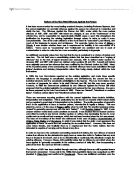To be liable for an attempted offence, the person needs to have mens rea for the whole of the offence and the actus rea must be beyond the merely preparatory stage. The merely preparatory test looks forward from the point of the preparatory act to see whether D’s acts have gone beyond that stage, in contrast with the proximity test. This was shown in Gullefer and Campbell, were both men were acquitted as they had not gone beyond the merely preparatory stage, some acts remained undone, so they could not be held liable. Gullefer’s acts would have been classed as more than merely preparatory had he gone back to request his money back and the acts done by Campbell were indicative of mere preparation but too many acts remained undone. The question in this case is what should the police have done in order to ensure D’s conviction for attempted robbery? If the police had let D enter the building, then this would have put people’s lives at risk; so the police were right to stop D from entering the building even though some acts remained undone. However, the outcome in Jones was different; here the defendant was convicted as his actions were enough to leave the jury to find him guilty.
In the case of Geddes the Court of Appeal offered formulation for identifying the threshold, by proposing the question, was D actually trying to commit the full offence? D had clear intent to commit the crime; however he had not gone beyond the mere preparation stage as he had not tried to make contacts with the pupils. The same principle was applied in Tosti & White, however in this case they were convicted as they had admitted that they tried to burgle the farm.
In Attorney – General’s Reference (No 1 of 1992), D was acquitted; however the court of appeal stated that there was sufficient evidence to convict. His acts were more than merely preparatory to the commission of the offence and D had the necessary intent. So the mens rea was there and the actus rea was attempted, D was only in short of committing the offence itself.
Attempts on murder was settled in Whybrow, here the court of appeal held that normally on a murder charge, an intention to cause GBH would suffice, where attempted murder was alleged, nothing less than an intent to kill would do. So for attempted murder, D needs higher intention then for murder itself.
In Attorney – General’s Reference (1 & 2 of 1979), the problem raised in Easom was settled. It was decided that in such cases D should be charged with an attempt to steal ‘some or all of the contents’ of the hand bag. The relevance of recklessness was settled in Khan. It was decided that recklessness forms part of the mens rea of the offence. In Attorney – General’s reference (No 3 of 1992), the precedent of Khan was followed. Here it was held that D had intended to damage property and was therefore being reckless as to whether life would be endangered.
If a crime is impossible to commit, it does not necessarily mean that no one can be convicted of attempting it. At common law, there was no liability for attempt if the crime attempted was physically or legally impossible. D could only be liable if his methods were inadequate to commit the substantive offence. This was seen in White, where D gave insufficient poison to his mother.
In conclusion I think that the law on attempts has now been settled as the courts now have guidance on when to convict for any crime. The Court of Appeal have settled attempted murder alleges and also the relevance of recklessness has been settled. However, despite all this guidance, some cases have still been wrongly decided. This was seen in the appeal of Attorney – General’s reference (No 1 of 1992), where Court of Appeal held the D was only in short of committing the offence itself.








